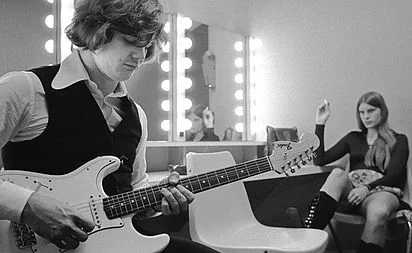Before the Steve Miller Band, there was the Steve Miller Blues Band. Before the Joker, before the Space Cowboy, before Maurice, there was Steve – guitarist extraordinaire, young, beautiful, and insanely talented, with an intense affinity for and knowledge of American Blues and Roots music. This Steve, in conjunction with Jazz at Lincoln Center, has been responsible for shining a bright light on the important historical and artistic roles that Blues guitar has played in American history - and, stemming from that, the role that Blues guitar has played in Steve Miller’s artistic journey. Some musicians seem to move further and further away from their creative roots and influences as they become more and more grounded in their lasting legacy, a legacy that propels itself into the future. But Steve is smarter than them; he always was.
Derailed, Sooner or Later: Warren Zevon’s Warren Zevon (1976)
This is the material world and if one vice doesn’t do you in, another one surely will. If nothing else, there is the obvious and ongoing erosion of each present self, the sly voice within us that lurks beneath the most laudatory of our triumphs. Mortality renders the measurability of our accomplishments to be largely at our own discretion. Sometimes this reaches us during the overwhelming silence of 3AM insomnia, sometimes during the most blissed-out of moments, when we’re trying our hardest to keep this knowledge at bay.
Mean Streets Music - Spoken and Sung
"We're the Eagles, from Los Angeles."
It is the evening of March 21st 1977 at the Capitol Centre, a now-extinct concert arena in a suburb of Washington, D.C. The Eagles are on stage. “Thank you and Good Evening,” Glenn Frey says to the audience following the group’s rendition of “Hotel California.” He stands upright, focused, guitar-draped, dressed in Young-American seventies garb - blue jeans, and a University-of-Colorado t-shirt. He is beautiful, he is a success, his band, having just released its career-topping Hotel California album, is a success. He knows it.
“A Man Went Looking for America… and Couldn’t Find it Anywhere”
Dennis Hopper’s 1969 film Easy Rider is perhaps the most definitive film of the 1960’s American counterculture. Along with producer Peter Fonda and screenwriter Terry Southern, Hopper had witnessed the rise and pre-fall of the youth movement that had been accelerating over the course of the decade, and wanted to speak to it directly. The characters’ journey paints a landscape of a deeply divided nation, a nation purporting to be a “land of the free” where anyone with long hair is verbally abused and sometimes murdered.



